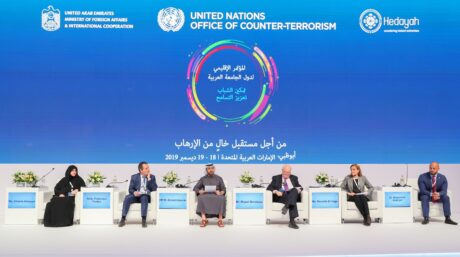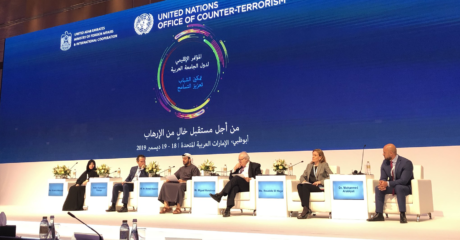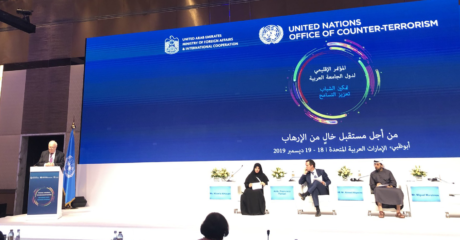Remarks by
H.E. Mr. Miguel Moratinos
The High Representative for UNAOC
at the UAE/UNOCT High-level panel on Promoting Tolerance for P/CVE
“Empowering Youth and Promoting Tolerance: Practical Approaches to PCVE”
18-19 December 2019
Your Excellency Mr. Chair Ahmed Al Qasimi, Executive Director of Hedayah
Your Excellency, Ms Lubna Al Qasemi, Former Minister of Tolerance,
Your Excellency Zaki Anwar Nusseibah, Minister of State for the Cultural Affairs,
And my dear friend Mr. Vladimir Voronkov,Under-Secretary-General for Counter-Terrorism,
Distinguished Panelists in this session,
It is indeed a great pleasure to be back to the United Arab Emirates. I was privileged to be here this past February when Abu Dhabi witnessed a historical moment that crowned the Year of Tolerance declared by its visionary leadership. The unique document for Human Fraternity for World Peace and Living Together co-signed by His eminence the Grand Imam of Al-Azhar Sheikh Ahmed El Tayeb and His Holiness was, by all means, a model for interfaith and tolerance. But more importantly, it embodies all the pre-requisites for acceptance and respect of the other. As such, I commend the forward-looking thinking of these two echelons representing the Sunni Muslim and the Catholic Christian worlds and the support of the leadership in the UAE.
Nurturing a culture of peace based on tolerance, acceptance and respect of the other is crucial to building cohesive and inclusive societies and an essential tool to prevent and counter violent extremism conducive to terrorism. The United Nations Alliance of Civilizations provides a viable tool for conflict prevention and conflict resolution through the promotion of intercultural and interfaith dialogue, diversity and respect of the other.
This brings me to the current global context where conflicts are becoming more complex and interconnected. A rise in hate speech, bigotry and xenophobia ignited a cycle of violence and terrorist acts targeting places of worship. At the same time, extremist groups use digital technology to increase their reach across borders and cultures targeting young people and offer them a twisted sense of purpose based on lies.
This is indeed a critical moment for our world. The United Nations is deeply engaged in a surge of diplomacy for peace. These efforts, we must acknowledge, had not always been successful. There are on-going conflicts that remain unresolved for decades. We should respond to those challenges with a different approach.
I just came this morning from Sharm El Sheikh, Egypt where I saw and heard these positive messages coming from 7000 young women and men who gathered at the World Youth Forum. Their stories, the work they do within their communities, their strong messages of peace and their innovative ideas were quite inspiring. I am convinced that youth are our hope for a better future on this planet. The Middle East and North Africa has a wealth of youth . with support from the international community and national governments, we can unleash their remarkable dynamism and capacity.
Looking at statistics, nearly half the world’s population – 46 percent – is 24 years old or younger. Africa and the Middle East have the highest proportions of young people. These young women and men are an asset to be nurtured, cherished and listened to. They represent hope and promise, they have a huge amount to offer our world – and they are a top priority for the United Nations as addressed in several UN Security Council and General Assembly Resolutions namely Security Council Res 2250 and 2419 as well as the Youth 2030 Strategy. For the United Nations Alliance of Civilizations, youth is central and front in our work. We work for them and with them. In addition to capacity building workshops in the MENA region through our Young Peace Builders program ( I see that one of our partners in this project “Generations for Peace” is present here). We also support youth-led grassroots. I will give you few examples of such projects that we supported in Africa, MENA region, and Asia:
In the State of Palestine we provided seed funding to the Palestinian Center for Communication and Development Strategies for their work in addressing intra-faith, political and socio-cultural divisions within Palestinian society, namely between Islamist, secular and liberal students in universities. Through the project, they engaged over 3,000 youth in intercultural and interfaith dialogue.
In Morroco, we supported Chantiers Sociaux Marocains who implemented their project through a traveling caravan that created space for artistic expression and dialogue between Moroccans and migrant communities in five small cities of Morocco, thus breaking stereotypes and reducing xenophobic incidents.
In Nigeria we provided seed funding to the Leadership Initiative for Youth Empowerment which trained 63 young Muslims and Christians from 24 faith-based organizations to serve as Intercultural Ambassadors, who were then supported to implement community events that promote understanding and tolerance. Overall, more than 36,000 people were engaged in these community events.
And in the Philippines, a Volunteers project, which provides extensive training to Muslim volunteers before placing them in Christian-led organizations. Their volunteers have contributed over 220,000 hours and directly or indirectly impacted the lives of more than 700,000 people in the Philippines.
These are but a few examples of how youth-led grassroots impact their communities and help in building cohesion and resilience in society. We need to do more to strengthen and empower those young people.
We should provide more space for dialogue that would include young women and men where their voices could be heard.
This being said, I reiterate that If we are serious about prevention, and particularly about preventing conflict, we need to be serious about engaging with and investing in young women and men.
We need their energy to tackle the most serious challenges facing us.
The UN Plan of Action to Safeguard Religious Sites which was developed by my office was launched by the UN Secretary-General on 12 September 2019 has a number of recommendations for all stakeholders including youth who will play an important role in this plan. Education is key if we truly want to empower youth. Educating young women and men about universal values such as accepting and respecting the other, embracing diversity as richness and tolerance as an inherent way of life is an essential preventive tool that will shield youth from falling prey to radical ideologies.
If we are to counter terrorists’ manipulative messages, we must engage with young people on their terms. So what can we do collectively in collaboration with Arab League countries in order to mobilize the full potential of youth in the region? We should not work in silos and I already see many partners that we have worked with before and new ones who have similar objectives.
Here are some examples :
1. I see a lot of opportunities for collaboration during the Expo 2021. The theme of Connecting Minds…Creating the Future provides a space for an open conversation, an intergenerational conversation. UNAOC stands ready to collaborate in creating such a space.
2. UNAOC will collaborate with the Higher Committee for Human Fraternity in the implementation of the Joint Document on Human Fraternity including ideas to promote interfaith dialogue, diversity and combatting violent extremism conducive to terrorism through the Abrahamic Family House
3. Hedaya is doing remarkable work with grassroots, governments and the private sector to deconstruct terrorism and build resilient societies. This comprehensive approach is also aligned with what we do at UNAOC where we work with diverse state and non-state actors. I already see many synergies in the work we do.
4. Collaboration with UNOCT continues. UNAOC as a vice-chair of the Working Group on PCVE (preventing and countering violent extremism) is closely engaged with UNOCT and new joint projects are in the pipeline to provide a counter-narrative to Violent Extremism beyond security setting solutions such as Global Programme on Security of Major Sport Events, and Promotion of Sport and its Values as a Tool to Prevent Violent Extremism
Ladies and gentlemen,
Dialogue and understanding, political inclusion and participation of the youth in the decision-making process has become imperative. We need to master strong political will to amplify the voices of youth and galvanize their power of change.
We need youth as partners and leaders. We need them as we build a peaceful and more sustainable world.



